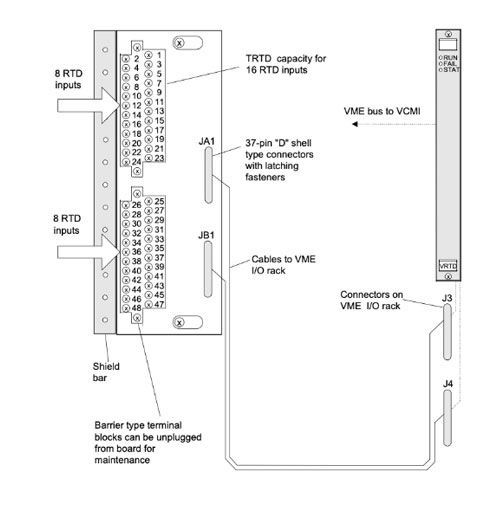GE IS200VRTDH1D IS200VRTDH1DAB VME RTD Card
Description
| Manufacture | GE |
| Model | IS200VRTDH1D |
| Ordering information | IS200VRTDH1DAB |
| Catalog | Mark VI |
| Description | GE IS200VRTDH1D IS200VRTDH1DAB VME RTD Card |
| Origin | United States (US) |
| HS Code | 85389091 |
| Dimension | 16cm*16cm*12cm |
| Weight | 0.8kg |
Details
The IS200VRTDH1D is a VME RTD Card manufactured by GE as part of the Mark VI series,It is a high-quality electronic card specially designed for industrial applications. It delivers reliable performance and advanced features for precise control and monitoring.
The module operating voltage is 200v, and the heat dissipation design has efficient heat dissipation characteristics. It also has real-time data processing capabilities.
There are 16 three-wire RTD inputs on the RTD board. To an RTD terminal board, these inputs are wired (TRTD or DRTD). The terminal board is connected to the VME rack, which holds the VRTD processor board, through cables with molded fittings.
RTDs are excited by the VRTD, and the ensuing signals are then returned to the VRTD. The inputs are transformed by VRTD into digital temperature values, which are subsequently sent from the VCMI to the controller through the VME backplane,
Turn off the processor rack for the VME,Place the board in place and use your hands to press the top and bottom levers into the seat of the edge connectors.Tighten the captive screws on the front panel's top and bottom.
Through the terminal board, VRTD provides a 10 mA dc multiplexed (not continuous) excitation current to each RTD. The signal that results in returns to VRTD.
Voltage to frequency converters and sample counters are used in the VCO type A/D converter. Using a temporal sample period corresponding to the power system frequency, the converter samples each signal as well as the excitation current four times per second for normal mode scanning and 25 times per second for fast mode scanning.
For a choice of 15 RTD kinds, software in the digital signal processor conducts the linearization.
IS200VRTDH1D provides redundant RTD inputs in a triple modular redundant (TMR) configuration by fanning the inputs across three VRTD boards in the R, S, and T racks.
High-frequency decoupling to the ground is included at signal input for all RTD signals. Due to redundant pacemakers, RTD multiplexing ensures that no RTD signals in the control database are lost even in the event of the loss of a single cable or VRTD.

















